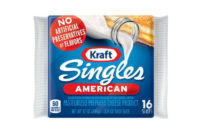More than half of the nation’s 100 largest dairies have completely or partially discontinued the use of recombinant bovine growth hormone, known as rBGH or rBST. The genetically engineered drug is injected into cows to induce them and produce more milk.
The list includes most of the largest processors in the country, including Dean Foods, Land O’ Lakes, Kraft, Foremost Farms, Darigold and Prairie Farms Dairy. And the trend shows no signs of slowing down. The two largest yogurt producers in the country, Dannon and Yoplait-Colombo, both reported they will discontinue the hormone by the end of this year.
According to Rick North of Oregon Physicians for Social Responsibility, which has coordinated a nationwide campaign opposing the hormone for more than five years, “The movement has gone mainstream. Three years ago, most of the rBGH-dairies were smaller and concentrated in the Pacific Northwest and northern New England. Now it’s nationwide and includes the biggest players.”
The trend also is expanding beyond fluid milk into other dairy products. Besides yogurt, more cheese and ice cream companies have responded. For instance, Tillamook Cheese, the second largest producer of chunk cheese in the nation, led the way by going rBGH-free in 2005. Agrimark, the 29th largest overall processor in the country, announced that its Cabot Cheese brand will stop accepting milk with rBGH this August.
These companies join well-known brands such as Ben & Jerry’s, which has never used the hormone.
“Our company has always believed that rBGH is a step in the wrong direction – and we’re glad to see such a significant move away from rBGH across the country. We are very encouraged that the market is catching up with what consumers want on this issue,” said Rob Michalak, Ben & Jerry's director of social mission.
Dairies going rBGH-free consistently cite consumer demand. A 2008 Consumer Reports survey found that 70% of respondents were concerned that cows were given artificial growth hormones and 57% would pay more for dairy products produced without it. This mirrored a 2007 survey commissioned by Chipotle Restaurants that found that 81% of people surveyed would prefer to buy dairy products from cows not treated with synthetic hormones if there was little price difference.
Consumer demand has also driven dairies below the top 100.
Sue Kesey, co-owner of Springfield Creamery in Eugene, Ore., the makers of Nancy’s Yogurt, said, “We continue to believe it is essential to provide folks with authentic food, which is why we have always sourced rBGH-free milk. We feel it is important and so do Nancy’s customers.”
In addition to individual consumers, more and more institutional buyers such as hospitals, schools and colleges have responded.
According to Health Care Without Harm, a coalition of more than 460 organizations that promote safe and healthy practices in hospitals, nearly 160 hospitals have signed its pledge committing to phase out products with rBGH.
Retailers also have been a major force driving the trend. The two largest supermarket chains in the country, Wal-Mart and Kroger, now sell only rBGH-free private label milk, and Chipotle and Starbucks company owned stores have gone completely rBGH-free.
Ben Packard, Starbucks vice president for global responsibility, said "Starbucks is pleased that we've been able to meet our customer requests to offer beverages made with milk from cows not treated with rBGH."
Organic milk, which by definition is rBGH-free, typically costs more than conventional rBGH-free brands. But even with the higher price, organic milk sales have grown by approximately 20% a year for a decade, although this has slowed recently due to the recession.
Although the FDA approved rBGH as safe in 1993, the hormone has been dogged by controversy. It increases disease rates in cows, including mastitis, which is treated by antibiotics. This could increase antibiotic resistance in humans, a major health problem.
RBGH also increases levels of another hormone that has been linked to higher cancer rates in humans.
The American Nurses Association, among numerous other organizations, has officially opposed rBGH and the past president of the American Medical Association advised AMA members to serve only rBGH-free milk in hospitals. Most industrialized countries, including Canada and all 27 nations of the European Union, forbid its use.
Oregon PSR’s North summarized, “The entire country is moving toward more healthy and sustainably produced foods, and rBGH-free dairy products are helping to lead the way.”
Stay ahead of the curve. Unlock a dose of cutting-edge insights.
Receive our premium content directly to your inbox.
SIGN-UP TODAYCopyright ©2024. All Rights Reserved BNP Media.
Design, CMS, Hosting & Web Development :: ePublishing
